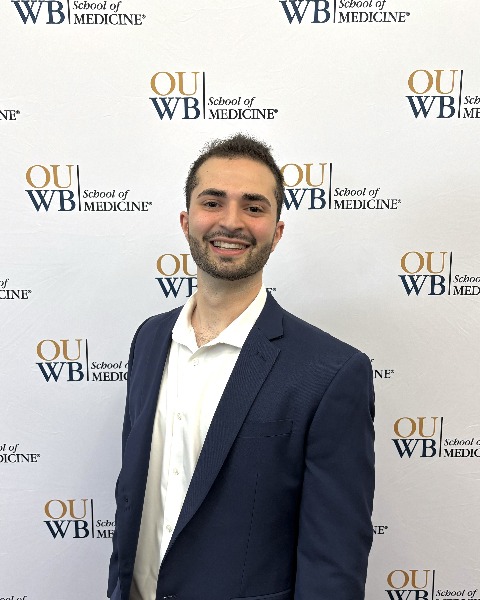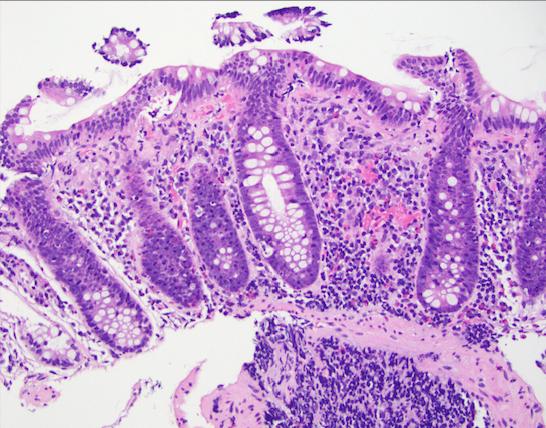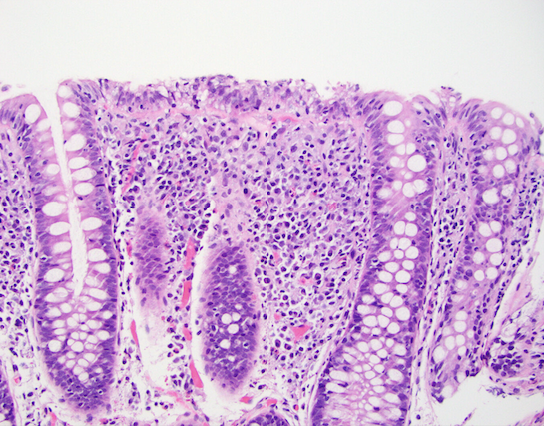Monday Poster Session
Category: Colon
P2510 - Clean Sweep: Unexpected Symptom Resolution of Microscopic Colitis Following Colonoscopy
Monday, October 27, 2025
10:30 AM - 4:00 PM PDT
Location: Exhibit Hall

Nicholas N. Totah, MD (he/him/his)
University of California Irvine Health
Orange, CA
Presenting Author(s)
Nicholas N. Totah, MD1, Shoujit Banerjee, MD2, Marie Balfour, MD1, Momin Masroor, MD2, Trevor McCracken, MD2, Daniel Mai, MD2, Sejal Shah, MD1, Vishal Chandan, MD3, Peter Nguyen, MD2, Gregory Albers, MD, FACG2
1University of California Irvine Health, Orange, CA; 2University of California Irvine, Orange, CA; 3University of California Irvine, Irvine, CA
Introduction: Microscopic colitis (MC) is a chronic inflammatory condition of the colon characterized by progressive, non-bloody diarrhea. While endoscopy findings may be normal, inflammatory changes can be seen in microscopy. Although treatment with antidiarrheals and budesonide is often effective, symptom recurrence and variable treatment responses remain clinical challenges. We highlight two cases of biopsy-proven MC in which patients demonstrated complete symptom resolution after colonoscopy. These cases illustrate a potential therapeutic effect of mechanical gut cleansing and the modulatory role of the microbiome in symptom control.
Case Description/
Methods: A 77-year-old female with CVA on ASA, OSA, GERD, HTN who presented for colonoscopy for persistent watery diarrhea refractory to loperamide, with an unremarkable infectious workup. Pathology from colonic biopsies revealed collagenous colitis (Figure 1). She was prescribed budesonide but never filled the prescription and had complete resolution of symptoms following her colonoscopy without recurrence. The second case is a 62-year-old male with CAD on ASA, HTN, HLD, who presented with persistent chronic watery diarrhea, initially thought to be due to post-COVID complications. The mucosa appeared normal during colonoscopy, with pathology showing lymphocytic colitis. He then reported resolution of symptoms following colonoscopy. Two years later, his symptoms returned; a repeat colonoscopy re-demonstrated diffuse lymphocytic colitis (Figure 2). Following colonoscopy, the patient reported complete resolution of symptoms, with improved stool frequency and consistency.
Discussion: These cases suggest a potential association between mechanical bowel preparation and symptom resolution in MC. There is some literature describing this phenomenon - one prospective study by Batista et al. in 2022 found 53% of MC patients experienced clinical remission following colonoscopy1. These observations may be explained by temporary alterations in the composition and diversity of the microbiome after bowel cleansing, thus raising questions regarding the role of microbial modulation in symptom management. Further investigation into the role of the gut microbiome is warranted in the context of therapeutic targets in MC.
1. Batista et al. Colonic bacterial diversity and dysbiosis in active microscopic colitis as compared to chronic diarrhoea and healthy controls: effect of polyethylene glycol after bowel lavage for colonoscopy. BMC Gastroenterol. 2022;22(1):320.

Figure: Figure 1. Histologic findings demonstrating an irregular sub-epithelial collagen band suggestive of collagenous colitis at 10x magnification.

Figure: Figure 2. Histologic expansion of lamina propria and increased intraepithelial lymphocytes, suggestive of lymphocytic colitis at 10x magnification.
Disclosures:
Nicholas Totah indicated no relevant financial relationships.
Shoujit Banerjee indicated no relevant financial relationships.
Marie Balfour indicated no relevant financial relationships.
Momin Masroor indicated no relevant financial relationships.
Trevor McCracken indicated no relevant financial relationships.
Daniel Mai indicated no relevant financial relationships.
Sejal Shah indicated no relevant financial relationships.
Vishal Chandan indicated no relevant financial relationships.
Peter Nguyen indicated no relevant financial relationships.
Gregory Albers: Nestle Pharmaceuticals – Speakers Bureau.
Nicholas N. Totah, MD1, Shoujit Banerjee, MD2, Marie Balfour, MD1, Momin Masroor, MD2, Trevor McCracken, MD2, Daniel Mai, MD2, Sejal Shah, MD1, Vishal Chandan, MD3, Peter Nguyen, MD2, Gregory Albers, MD, FACG2. P2510 - Clean Sweep: Unexpected Symptom Resolution of Microscopic Colitis Following Colonoscopy, ACG 2025 Annual Scientific Meeting Abstracts. Phoenix, AZ: American College of Gastroenterology.
1University of California Irvine Health, Orange, CA; 2University of California Irvine, Orange, CA; 3University of California Irvine, Irvine, CA
Introduction: Microscopic colitis (MC) is a chronic inflammatory condition of the colon characterized by progressive, non-bloody diarrhea. While endoscopy findings may be normal, inflammatory changes can be seen in microscopy. Although treatment with antidiarrheals and budesonide is often effective, symptom recurrence and variable treatment responses remain clinical challenges. We highlight two cases of biopsy-proven MC in which patients demonstrated complete symptom resolution after colonoscopy. These cases illustrate a potential therapeutic effect of mechanical gut cleansing and the modulatory role of the microbiome in symptom control.
Case Description/
Methods: A 77-year-old female with CVA on ASA, OSA, GERD, HTN who presented for colonoscopy for persistent watery diarrhea refractory to loperamide, with an unremarkable infectious workup. Pathology from colonic biopsies revealed collagenous colitis (Figure 1). She was prescribed budesonide but never filled the prescription and had complete resolution of symptoms following her colonoscopy without recurrence. The second case is a 62-year-old male with CAD on ASA, HTN, HLD, who presented with persistent chronic watery diarrhea, initially thought to be due to post-COVID complications. The mucosa appeared normal during colonoscopy, with pathology showing lymphocytic colitis. He then reported resolution of symptoms following colonoscopy. Two years later, his symptoms returned; a repeat colonoscopy re-demonstrated diffuse lymphocytic colitis (Figure 2). Following colonoscopy, the patient reported complete resolution of symptoms, with improved stool frequency and consistency.
Discussion: These cases suggest a potential association between mechanical bowel preparation and symptom resolution in MC. There is some literature describing this phenomenon - one prospective study by Batista et al. in 2022 found 53% of MC patients experienced clinical remission following colonoscopy1. These observations may be explained by temporary alterations in the composition and diversity of the microbiome after bowel cleansing, thus raising questions regarding the role of microbial modulation in symptom management. Further investigation into the role of the gut microbiome is warranted in the context of therapeutic targets in MC.
1. Batista et al. Colonic bacterial diversity and dysbiosis in active microscopic colitis as compared to chronic diarrhoea and healthy controls: effect of polyethylene glycol after bowel lavage for colonoscopy. BMC Gastroenterol. 2022;22(1):320.

Figure: Figure 1. Histologic findings demonstrating an irregular sub-epithelial collagen band suggestive of collagenous colitis at 10x magnification.

Figure: Figure 2. Histologic expansion of lamina propria and increased intraepithelial lymphocytes, suggestive of lymphocytic colitis at 10x magnification.
Disclosures:
Nicholas Totah indicated no relevant financial relationships.
Shoujit Banerjee indicated no relevant financial relationships.
Marie Balfour indicated no relevant financial relationships.
Momin Masroor indicated no relevant financial relationships.
Trevor McCracken indicated no relevant financial relationships.
Daniel Mai indicated no relevant financial relationships.
Sejal Shah indicated no relevant financial relationships.
Vishal Chandan indicated no relevant financial relationships.
Peter Nguyen indicated no relevant financial relationships.
Gregory Albers: Nestle Pharmaceuticals – Speakers Bureau.
Nicholas N. Totah, MD1, Shoujit Banerjee, MD2, Marie Balfour, MD1, Momin Masroor, MD2, Trevor McCracken, MD2, Daniel Mai, MD2, Sejal Shah, MD1, Vishal Chandan, MD3, Peter Nguyen, MD2, Gregory Albers, MD, FACG2. P2510 - Clean Sweep: Unexpected Symptom Resolution of Microscopic Colitis Following Colonoscopy, ACG 2025 Annual Scientific Meeting Abstracts. Phoenix, AZ: American College of Gastroenterology.
